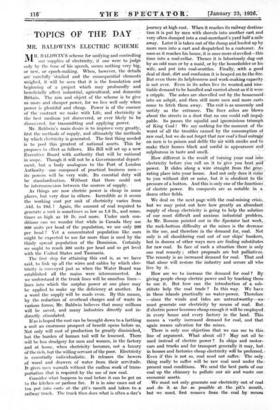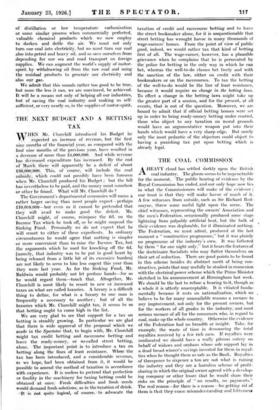TOPICS- OF- THE DAY
only by the tone of his 'speech, seems nothing very- big; or • hew,. or epoch-niaking. When, however, the detail's are learefiilly .‘ StUdied and the Consequential .-elemeriti weighed, it• will be seen that it is the foundation and beginning of a project which - may profoundly -and beneficially aftWt industrial,- agricultural; and domestic The aim and object of the scheme is to give" us more and .cheaper 'power, for we live well only when power is plentiful and cheap. Power is of the essence of ' thb contract we Makes with Life, and electricity is the best inediurn 'yet discovered, or ever likely to be discovered,- for transmitting and- applying power.
Mr. Baldwin's main desire is to -improve very greatly; ' first the thethodS of supply, and ultimately the Methods' by which electricity is generated.. The first thing needed is to - pool this greatest of national asseta. This he proposes to effect as follows. His Bill will set -up a -nevi,' Executive Board with authority that will be national in scope. Though it-will not be a Governmental depart,. ment, but a body analogous to the Port of London Authority----one- composed of practical business its• powers will be very wide. Its essential duty will be' standardization. -Without- that there could - not be interconnexion between the sources of -supply. • • • As things are now electric power _.is cheap in some places, but very dear in others. • Incredible as it seems the working cost per unit of • electricity- varies from .44d. to 10d. ! Again, the amount of coal required to generate a unit is sometimes as low -as 1.8 lb., and some- times as high as 10 lb. and more. Under such con- ditions - can we wonder that while -in Canada they use 900 units -per head of the population, we use only 200 per head ? Yet a concentrated population like ours might be expected to use far more than is used by the thinly spread population of the Dominion. Certainly we ought to reach 500 units per head and so get level with the United States and Tasmania. • • The first step for attaining this end is, as we have said, to link up all the wires and cables by which elec., tricity is conveyed just as when the Water Board was established all the mains were interconnected. As we understand it the trunk lines will be omnibus lines— lines into- which the surplus power at one -place may be applied to make up the deficiency at another. In a word- the- supply will be made even. By this means, by the reduction- of overhead charges and of waste in various • forms,- Mr: Baldwin believes that many millions will be saved; and many industries directly and in- directly, stimulated.
Has is hoped the cost can be brought down to a farthing a- unit an enormous prospect of benefit opens before us. Not only will cost of- production be greatly. diminished, but the burden of human toil will be lessened. - -There -will be less drudgery for men and women, in the factory .and at home, • when electricity- becOmes, not - a luxury of the rich, but the willing servant of the poor. - Electricity is essentially individualistic. It releases the hewers pf • wood and . drawers of water from their servitude. It- gives men warmth without the endless work of trans, portation that is required by the use of raw coal. - Consider -what • happens to coal- before it can be got on to the kitchen orparlour fire.. It is in „nine cases out of ten put -into -carts .at -the- pit's- mouth and taken .to a railwa-y truck. The truck then does what is often- a- day's journey at high cost. When it reaches its railway destine..?
tiona is put by men with shovels into another cart and very often dumped into a coal-merchant's yard half a.reile away. Later it is taken out of the dump and loaded up by more men into a cart and despatched to a customer. As soon as it reaches-his house, it is once more shovelled—this time into a coal ;cellar. Thence it is laboriously dug out by an odd man or by a maid, or by_ the householder or his wife, and put into coal-scuttles. Finally, with .a good deal of dust, dirt and confusion it is heaped on,to_thel•fire. But even there its helplessness and work-making capacity is not over. -Even in its ashes live its wonted:artd bite- tiable demand to be handled and carried about as if it were- a cripple. The ashes are shovelled out by, the housemaid into an ashpit; and -then still more men and more carts come to fetch them away: The exit is as unseemly and untidy as the entrance. The finer ashes are blown about the streets in a dust that no one could call impal- pable. So passes the squalid Wand ignominious triumph of King Coal ! We say nothing for the moment of the worst of all the troubles caused by the consumption of raw coal, but we do not forget that raw coal'Sfinal ontrake on men is to poison and defile the air with smoke and to make their homes black and sordid in appearance and sulphurous in taste and smell.
How different is the result of turning your coal into electricity before you call on it to give you heat and poWer. It slides along a wire straight from the gene- rating place into your house. And not only does it come to you without dirt or noise, but it is obedient to the pressure of a button. And this is only one of the functions of electric power. Its conquests are as notable in a dozen other fields.
We deal on the next page with the coal-mining crisis, , but we may point out here how greatly an abundant supply of cheap electricity is going to help the solution of our most difficult and anxious industrial problem As Mr. Bossorn pointed out in the Spectator last week, . the rock-bottom difficulty at the mines is the decrease in the use, and _therefore in the demand for, coal. Not only is oil shouldering coal out of our ships' bunkers, but in dozens of other ways men are finding substitutes for raw coal. In face of such a situation there is only one real remedy ; other proposals are but palliatives. The remedy is an increased demand for coal. That and that alone will restore the industry and secure all who live by it.
How are we to increase the demand for coal ? By giving people cheap electric power and by teaching them to use it. But how can the introduction of a. sub- stitute help the coal trade ? In this way. We have in these islands practically no water-power. Therefore —since the winds and tides are untrustworthy—we- must generate our electricity by means- of coal. But . if electric power becomes cheap enough it will be employed , in every house and every factory in -the land. This means a vastly increased demand for coal, and that again means salvation for the mines.
There is only one objection that we can see to this line of argument. What about oil ? May not oil be used instead of electric power ? In ships and motor- cars and trucks and for transport generally it •may, but _ in houses and factories cheap electricity will be preferred:= Even if this is not so, coal need not suffer.- The only .
thing really to suffer will be raw coal used under the- present mad conditions. We- send the best parts of our coal up the chimney to pollute our air and waste our economic assets. • - •We must not only-.generate our electricity out of coal and _do. it as lar as possible at. the pit's mouth, but we. must. first -remove from - the - coal by. means of distillation or low temperature carbonization or some similar process when -commercially perfected, valuable chemical . products which we now employ to darken and defile the air. We must not only turn our coal into electricity, but we must turn our coal also into. petrol and heavy oil, and so save ourselves from depending for our sea and road transport on foreign supplies.• We can augment the world's supply of -motor- spirit, by withdrawing oil from the raw coal and using the residual products to generate our electricity and .• 'also onr gas.
. We admit that -this sounds rather too good to be true, but none the less it can, we are convinced, be achieved. It will be a means not only of helping all our industries, but of -saving the coal industry and making us self- sufficient, or very nearly so, in the- supplies of motor-spirit.











































 Previous page
Previous page